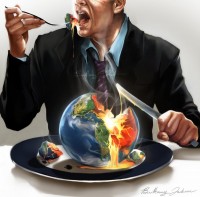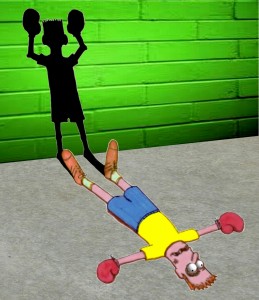
Is the glass half full or half empty?… That IS the question!
The Middle Feeder takes its feeding opportunities less seriously than those at the top of the feed chain. At the top, predation is more aggressive and confrontational, meaning – more of an even playing field for both predator and prey. For example, the sharks are big, fast and confident as are many of their prey like Tuna and Swordfish. The sharks have little regard to the way they feed and thus often waste more than they swallow. That waste falls to the benefit of the middle area – where the Middle Feeders hang out. Caught in this descending food spiral are the remnants of broken lives, leftovers from empty energy investments, etc.
Middle Feeders are concerned about location. They like to follow the big fish – hoping to live off the leftovers. For example, a newscaster following a presidential candidate might embellish upon the faux pas and negative utterances made by the candidate.
Middle Feeders have a loosely held set of feeding rules that apply more to others than to them. A Middle Feeder builds a whole feeding reality around their beliefs, which includes wishing they had more than they need – a “wannabe” wish. They feel envious of those they consider higher up the social ladder than them. They settle for less as long as there is a steady feed flowing to them – their credo is, “It’s good enough”. They are quick to point out the faults of the rich and poor alike in order to make their position more palatable.
The Middle Feeder is plagued by the terrifying desire for more of what they envy in others, but the idea of paying the price for satisfying that desire means a level of commitment or effort that exists outside their comfort zone. It’s just more convenient and far less risky.
In the mind of a Middle Feeder being passive is a virtue, yet all the while they want to appear as though they are making a stand for a good cause. Appearance is important, which allows the Middle Feeder to associate with those outside of their comfort in relative safety. Under the guise of friendship and fellowship, they wait their opportunity to dig or expose. Yum, yum!
Middle Feeders love to cry foul while hiding behind cohorts. There, limited conscience can provide unlimited feeding opportunities.


